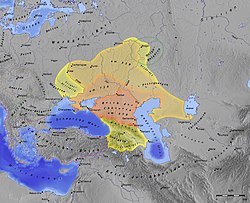Khazars
|
||||||||||||||
| Khazar Khaganate | ||||||||||||||
|
||||||||||||||
|
Khazar Khaganate, 650–850
|
||||||||||||||
| Capital | ||||||||||||||
| Languages | Khazar | |||||||||||||
| Religion | ||||||||||||||
| Political structure | Khazar Khaganate | |||||||||||||
| Qaghan | ||||||||||||||
| • | 618–628 | Tong Yabghu | ||||||||||||
| • | 9th century | Bulan | ||||||||||||
| • | 9th century | Obadiah | ||||||||||||
| • | 9th century | Zachariah | ||||||||||||
| • | 9th century | Manasseh | ||||||||||||
| • | 9th century | Benjamin | ||||||||||||
| • | 10th century | Aaron | ||||||||||||
| • | 10th century | Joseph | ||||||||||||
| • | 10th century | David | ||||||||||||
| Historical era | Middle Ages | |||||||||||||
| • | Established | c. 650 | ||||||||||||
| • | Disestablished | c. 1048 | ||||||||||||
| Area | ||||||||||||||
| • | 850 | 3,000,000 km² (1,158,306 sq mi) | ||||||||||||
| Population | ||||||||||||||
| • | 7th century est. | 1,400,000 | ||||||||||||
| Currency | Yarmaq | |||||||||||||
|
||||||||||||||
in Anatolia
Artuqid dynasty
Saltuqid dynasty
in Azerbaijan
Ahmadili dynasty
Ildenizid dynasty
in Egypt
Tulunid dynasty
Ikhshidid dynasty
in Fars
Salghurid dynasty
in The Levant
Burid dynasty
Zengid dynasty
in Yemen
Rasulid dynasty
The Khazars (Turkish: Hazarlar, Azerbaijani: Xəzərlər, Tatar: Xäzärlär, Hebrew: כוזרים (Kuzarim),Arabic: خزر (khazar), Ukrainian: Хоза́ри, Russian: Хаза́ры, Persian: خزر, Greek: Χάζαροι, Latin: Gazari/Gasani) were a semi-nomadic Turkic people, who created what for its duration was the most powerful polity to emerge from the breakup of the Western Turkic Kaganate. Astride a major artery of commerce between northern Europe and southwestern Asia, Khazaria became one of the foremost trading emporia of the medieval world, commanding the western marches of the Silk Road and playing a key commercial role as a crossroad between China, the Middle East and Kievan Rus'. For some three centuries (c. 650–965) the Khazars dominated the vast area extending from the Volga-Don steppes to the eastern Crimea and the northern Caucasus.
...
Wikipedia

